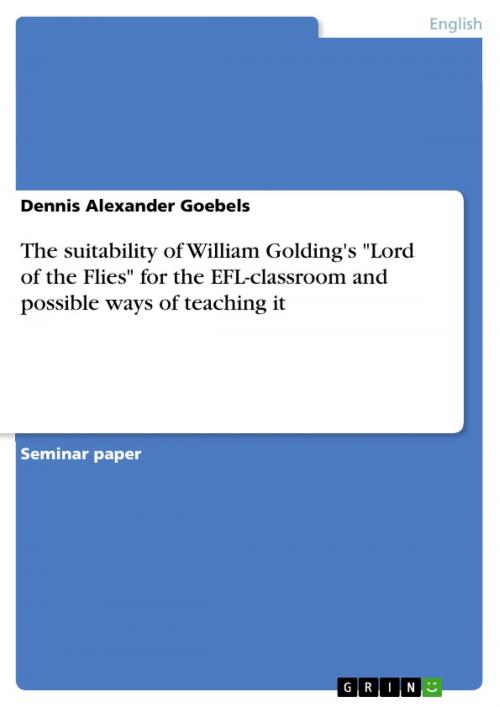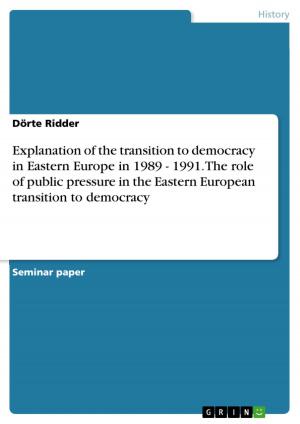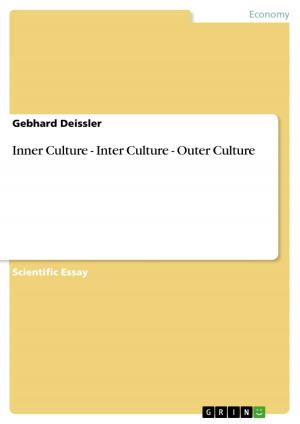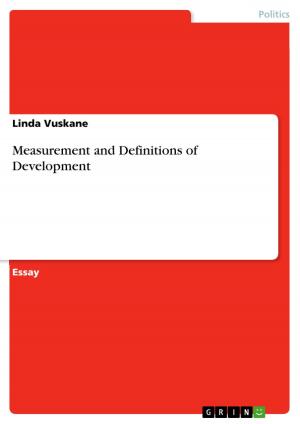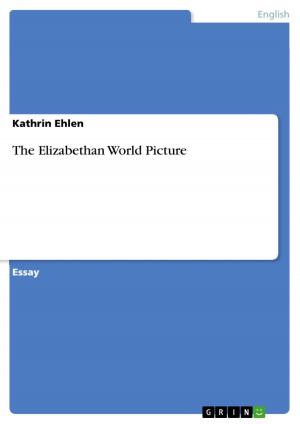The suitability of William Golding's 'Lord of the Flies' for the EFL-classroom and possible ways of teaching it
Fiction & Literature, Literary Theory & Criticism, British| Author: | Dennis Alexander Goebels | ISBN: | 9783640525645 |
| Publisher: | GRIN Publishing | Publication: | February 2, 2010 |
| Imprint: | GRIN Publishing | Language: | English |
| Author: | Dennis Alexander Goebels |
| ISBN: | 9783640525645 |
| Publisher: | GRIN Publishing |
| Publication: | February 2, 2010 |
| Imprint: | GRIN Publishing |
| Language: | English |
Seminar paper from the year 2009 in the subject English Language and Literature Studies - Literature, grade: 1,3, Ruhr-University of Bochum (Englisches Seminar), course: Teaching Literature, language: English, abstract: Few texts have been taught and dealt with more in school than William Golding's Lord of the Flies (1954). It has been part of the unofficial `school-canon' for more than three decades now and therefore it is useful to examine the suitability of this text for the EFL-classroom. This will be done by introducing the criteria for selecting texts given in Engelbert Thaler's Teaching English Literature, adding some elements from Ansgar Nünning's and Carola Surkamp's Englische Literatur Unterrichten. Grundlagen und Methoden and applying both to Lord of the Flies. First, a short summary of the plot will be given before the text will be analyzed with reference to its appropriateness for the EFL-classroom. This analysis will take place in four steps: First, the formal aspects will be taken into account, and then the thematic aspects will be discussed. Thirdly, the aspects related to reception will be illuminated. At the end a conclusion will be drawn whether or not for me Lord of the Flies is a suitable text for the EFL-classroom. In the course of the paper there will be given some hints as to how a certain aspect could be investigated further in the EFL-classroom. These hints are by no means a complete list and several aspects could be added to it. The decision which aspects should be included and which should be left out is up to the teacher who has to decide with regard to the amount of time he wants to spend on Lord of the Flies and with regard to the preconditions in his class
Seminar paper from the year 2009 in the subject English Language and Literature Studies - Literature, grade: 1,3, Ruhr-University of Bochum (Englisches Seminar), course: Teaching Literature, language: English, abstract: Few texts have been taught and dealt with more in school than William Golding's Lord of the Flies (1954). It has been part of the unofficial `school-canon' for more than three decades now and therefore it is useful to examine the suitability of this text for the EFL-classroom. This will be done by introducing the criteria for selecting texts given in Engelbert Thaler's Teaching English Literature, adding some elements from Ansgar Nünning's and Carola Surkamp's Englische Literatur Unterrichten. Grundlagen und Methoden and applying both to Lord of the Flies. First, a short summary of the plot will be given before the text will be analyzed with reference to its appropriateness for the EFL-classroom. This analysis will take place in four steps: First, the formal aspects will be taken into account, and then the thematic aspects will be discussed. Thirdly, the aspects related to reception will be illuminated. At the end a conclusion will be drawn whether or not for me Lord of the Flies is a suitable text for the EFL-classroom. In the course of the paper there will be given some hints as to how a certain aspect could be investigated further in the EFL-classroom. These hints are by no means a complete list and several aspects could be added to it. The decision which aspects should be included and which should be left out is up to the teacher who has to decide with regard to the amount of time he wants to spend on Lord of the Flies and with regard to the preconditions in his class
